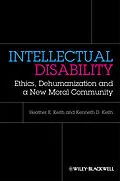Intellectual Disability: Ethics, Dehumanization, and a New Moral Community presents an interdisciplinary exploration of the roots and evolution of the dehumanization of people with intellectual disabilities.
* Examines the roots of disability ethics from a psychological, philosophical, and educational perspective
* Presents a coherent, sustained moral perspective in examining the historical dehumanization of people with diminished cognitive abilities
* Includes a series of narratives and case descriptions to illustrate arguments
* Reveals the importance of an interdisciplinary understanding of the social construction of intellectual disability
Autorentext
Heather E. Keith is Associate Professor of Philosophy at Green Mountain College, Vermont. Her work has appeared in such publications as The Transactions of the Charles S. Peirce Society, The Journal of Chinese Philosophy, Streams of William James, and the Encyclopedia of American Philosophy.
Kenneth D. Keith is Professor Emeritus of Psychological Sciences at the University of San Diego. The author, co-author, or editor of more than 100 scientific and professional publications including The Wiley-Blackwell Encyclopedia of Cross-Cultural Psychology, Keith is also a Fellow of the American Psychological Association in the divisions on teaching and on international psychology, and a Fellow of the Western Psychological Association and the Association for Psychological Science.
Zusammenfassung
Intellectual Disability: Ethics, Dehumanization, and a New Moral Community presents an interdisciplinary exploration of the roots and evolution of the dehumanization of people with intellectual disabilities.
- Examines the roots of disability ethics from a psychological, philosophical, and educational perspective
- Presents a coherent, sustained moral perspective in examining the historical dehumanization of people with diminished cognitive abilities
- Includes a series of narratives and case descriptions to illustrate arguments
- Reveals the importance of an interdisciplinary understanding of the social construction of intellectual disability
Inhalt
Acknowledgements vii
Prologue:Why Study Disability? ix
Part I The Roots of Dehumanization 1
1 Intellectual Disability: History and Evolution of Definitions 3
2 The Social Construction of Purgatory: Ideas and Institutions 19
3 A Failure of Intelligence 37
4 The Consequences of Reason: Moral Philosophy and Intelligence 53
Part II Out of the Darkness 77
5 Defining the Person: The Moral and Social Consequences of Philosophies of Selfhood 79
6 Alternative Views of Moral Engagement: Relationality and Rationality 95
7 Culture and Intellectual Disability 116
Part III Disability Ethics for a New Age 131
8 Quality of Life and Perception of Self 133
9 Application and Best Practices: Rights, Education, and Ethics 151
10 Epilogue: Visions of the Future 170
References 177
Name Index 215
Subject Index 225
